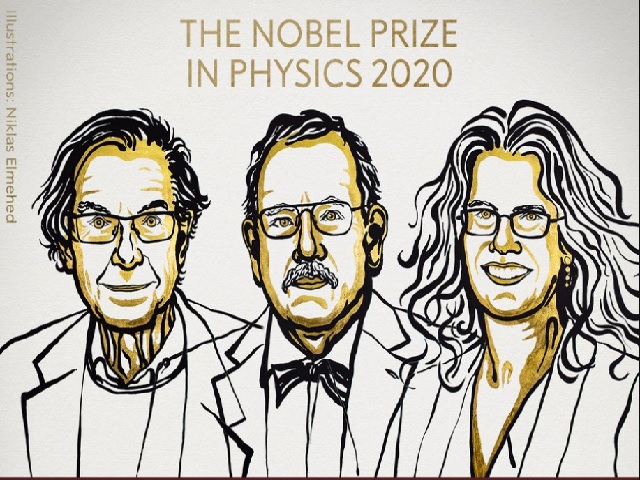By Qingyang Zhang, Y13
On the 6th of October, the Royal Swedish Academy of Sciences awarded the Nobel Prize in Physics 2020 to three physicists’ work on supermassive black holes. Half of the prize was awarded to Roger Penrose for theoretically showing that black holes are a “robust prediction” of Einstein’s theory of general relativity. The other half was jointly awarded to Reinhard Genzel and Andrea Ghez for their experimental work concerning supermassive black holes. Ghez is the fourth woman to be awarded the Nobel Prize in Physics.
This year’s Nobel Prize in Physics is interesting because it demonstrates the use of technology in fundamental research (scientific research with no foreseen application to the real world). Ghez used adaptive optics, to produce images of the galactic center at a high resolution, providing evidence that there exists a supermassive black hole that governs the motion of stars around the Galactic center.
Adaptive optics is a technology that reduces images’ blurring. A sensor receives light from a telescope image, distorted by the atmosphere or other obstacles. Light can be seen as a wave with wavefronts; similarly, a distorted wave can be seen as non-uniform wavefronts, which are then picked up by the sensor. Using data from these non-uniform wavefronts, a computer calculates the optimal mirror shape that would readjust the wavefronts to make them uniform. This results in an undistorted image with improved resolution. Using this technology, Ghez and her colleagues took successive images from telescopes, improved the resolution and produced high resolution videos of the Galactic centre.
Much of the advancement in adaptive optics technology was during the Cold War, when high resolution imaging was necessary for telescopes to track the precise location of enemy missiles and satellites. It is interesting how politics and conflict drive technological advancements, and can have a positive impact on scientific research. Adaptive optics technology resulted in a success story – scientists learnt about the inner workings of our galaxy. However, another example of politics driving fundamental research is the invention of the atomic bomb, which has cost hundreds of thousands of lives. Ethics needs to be considered in physicists’ work, and more broadly, in science as a whole.
This reminds me of an article I read on how AI algorithms with security and privacy risks (e.g. Deepfake) are used and developed by physicists to simulate proton collisions at the Large Hadron Collider for fundamental research. In the article, MIT physicist Max Tegmark warns that physicists ought not to use AI carelessly, as when such technology leaks out to the general public and into menacing hands, people’s safety and privacy could be put at risk.
Ethical issues are present in chemistry too: on the 7th of October, the Nobel Prize in Chemistry 2020 was awarded to Emmanuelle Charpentier and Jennifer Doudna for “the development of a method for genome editing”. Although the ability to edit genes will help cure diseases and improve well-being, it comes with its problems. In what cases should parents be allowed to edit their child’s genes? Where is the line between gene editing and eugenics? Is it fair for people without an edited genome to compete for jobs with genetically engineered people?
As the American physician Richard Cabot once said, “Ethics and Science need to shake hands”.
Sources and further reading:
Genzel: https://www.mpg.de/15493117/nobel-prize-physics-2020-genzel
https://en.wikipedia.org/wiki/Reinhard_Genzel#cite_note-aa33718-18-7
Ghez: https://en.wikipedia.org/wiki/Andrea_M._Ghez
Adaptive optics: https://en.wikipedia.org/wiki/Adaptive_optics#History



